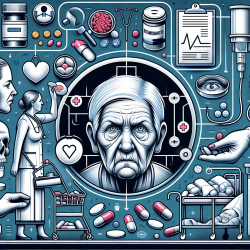Introduction
As practitioners in the field of speech-language pathology and related disciplines, our primary goal is to create meaningful outcomes for our clients. This blog post delves into the findings of a recent study titled "The Effectiveness of an Intensive Inpatient Psychotherapy Program for Chronic Depression: A Naturalistic Comparison with Wait List" (Eielsen et al., 2022). The study provides critical insights into how intensive psychotherapy can be leveraged to improve treatment outcomes for chronic depression (CD).
Understanding Chronic Depression
Chronic depression is a persistent and often debilitating condition characterized by early symptom onset, frequent comorbidities, and a challenging treatment history. The study by Eielsen et al. (2022) highlights the complexities of CD, which includes both persistent depressive disorder (PDD) and recurrent major depressive disorder (rMDD).
Study Overview
The study investigated the effectiveness of two intensive inpatient psychotherapy treatments—Affect Phobia Therapy (APT) and VITA—compared to a wait list control group receiving treatment as usual (TAU). The primary outcome measure was the Beck Depression Inventory-II (BDI-II), a well-validated tool for assessing depression severity.
Key Findings
- The intensive inpatient treatment program demonstrated a significant advantage over the wait list control group, with a large effect size (d = 0.9).
- No significant differences were observed between the APT and VITA treatments, suggesting that the treatment context rather than the specific therapeutic model was the key factor in the observed improvements.
- Both treatment groups maintained their improvements at a one-year follow-up, indicating the durability of the treatment effects.
Implications for Practice
For practitioners, these findings underscore the potential benefits of intensive, high-frequency psychotherapy for clients with chronic depression. The study suggests that a comprehensive inpatient program that combines individual and group therapies can provide substantial benefits. Here are some practical takeaways:
- Consider advocating for or implementing high-frequency therapy sessions, as increased session frequency has been associated with better outcomes.
- Explore the integration of multiple therapeutic modalities to address the multifaceted nature of chronic depression.
- Evaluate the potential for inpatient programs to provide corrective interpersonal experiences, which are less feasible in outpatient settings.
Conclusion
The study by Eielsen et al. (2022) provides robust evidence supporting the use of intensive inpatient psychotherapy for chronic depression. As practitioners, we are encouraged to consider these findings in our clinical decision-making processes, always striving for data-driven approaches to enhance client outcomes.
To read the original research paper, please follow this link: The Effectiveness of an Intensive Inpatient Psychotherapy Program for Chronic Depression: A naturalistic comparison with wait list.










